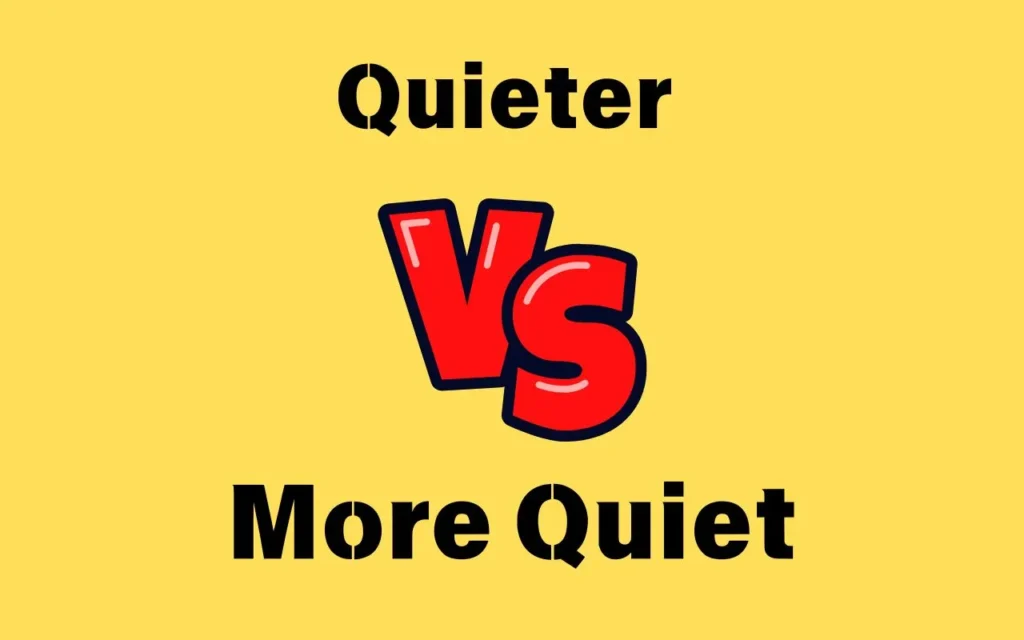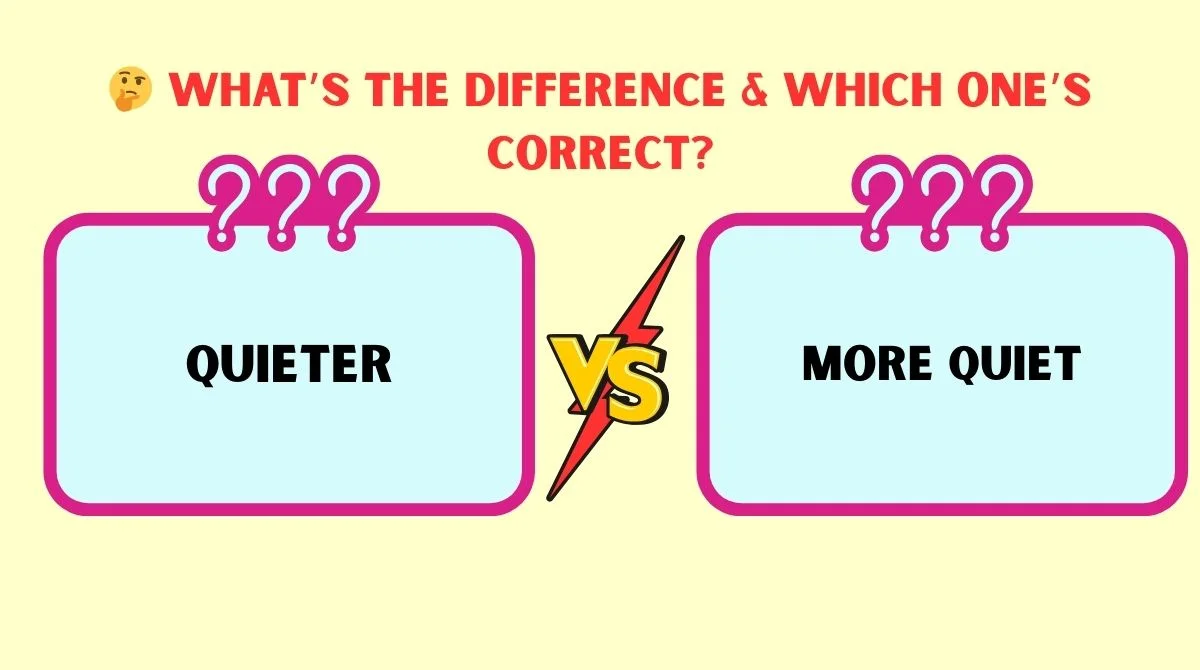Last updated on September 26th, 2025 at 03:16 pm
English grammar has a funny way of throwing curveballs when you least expect it. Words like “quieter” and “more quiet” look so similar yet often leave learners scratching their heads.
Are both correct? Which one sounds natural? And when should you use one over the other?
Here’s the good news: both forms are grammatically correct. But that doesn’t mean they’re used the same way.
In this guide, we’ll break down every detail you need to know, from basic grammar rules to real-world usage, so you never hesitate when choosing between quieter and more quiet.
Both quieter and more quiet are grammatically correct. The difference lies in preference—quieter is the natural choice in everyday English, while more quiet adds emphasis or formality.
Understanding “Quiet” as an Adjective

Before we compare, let’s start with the root word: quiet.
- Part of speech: Adjective
- Meaning: Little or no noise; calm; peaceful.
Examples:
- The library is quiet.
- He enjoys a quiet life in the countryside.
Why does this matter? Because adjectives change form when we want to compare. And that’s exactly where quieter and more quiet come in.
Quieter as the Standard Comparative Form
For one-syllable adjectives like quiet, English typically forms comparatives by adding -er.
- Tall → Taller
- Small → Smaller
- Quiet → Quieter
Quieter follows the most natural pattern. That’s why you’ll hear native speakers use it more often than “more quiet.”
Examples:
- The garden is quieter than the street outside.
- She spoke in a quieter voice to avoid waking the baby.
A quick note: “quiet” technically has two syllables (qui-et), but it’s still treated like a one-syllable adjective because of its short sound. That’s why the -er form feels natural.
👉 Rule of thumb: For everyday situations, “quieter” is the go-to choice.
When “More Quiet” Is Grammatically Correct
So if “quieter” is standard, does that make “more quiet” wrong? Not at all. It’s just less common and usually chosen for emphasis.
Consider these examples:
- We need a more quiet environment to concentrate.
- This design creates a more quiet and peaceful space.
In these cases, “more quiet” adds weight, almost as if saying “extra quiet.” Writers may also prefer it for rhythm or style, especially in poetry, speeches, or formal texts.
Stylistic usage example from literature:
“I long for a more quiet retreat, far from the city’s endless noise.”
👉 Think of “more quiet” as a deliberate choice. It’s correct, but it feels slightly formal or emphatic compared to the easy flow of “quieter.”
Quieter vs More Quiet in Real Usage
Here’s where things get interesting. Both forms exist, but which one do people actually use?
Studies of written and spoken English show that:
- Quieter is far more common in everyday conversation.
- More quiet appears in formal writing, literature, or when speakers want to emphasize calmness.
Frequency Comparison
| Form | Common Contexts | Frequency in Use | Example Sentence |
|---|---|---|---|
| Quieter | Casual speech, everyday writing | Very common | This café is quieter than Starbucks. |
| More Quiet | Formal tone, emphasis, stylistic writing | Less common | The monastery offers a more quiet retreat. |
👉 Tip: If in doubt, choose “quieter.” It’s natural and widely accepted. Use “more quiet” sparingly, when you want a stronger emphasis.
Quietest or The Most Quiet – Which Should You Use?
Comparatives aren’t the end of the story. When we want to describe the highest degree of quiet, we move to the superlative form.
- Quieter → Quietest
- More quiet → Most quiet
Which one is correct?
Both. But just like with comparatives, the -est form is more natural.
Examples:
- This is the quietest place in town.
- She is the quietest student in the class.
“The most quiet” isn’t wrong, but it tends to sound heavy and is usually chosen for stylistic effect.
Example:
- That was the most quiet evening we ever spent together.
👉 Rule: Use “quietest” in everyday English. Use “the most quiet” only when you want an elevated or literary tone.
Quieter vs Less Noisy
Sometimes, instead of saying “quieter,” people say “less noisy.” Are these two the same? Not exactly.
- Quieter: Puts focus on peace and calm.
- Less noisy: Focuses on the absence of noise.
Usage Examples
- The library is quieter than the park. (positive emphasis on calmness)
- The park is less noisy than the market. (negative emphasis on reduced noise)
Think of them as two sides of the same coin. One stresses presence of calm, the other stresses reduction of disturbance.
👉 Both are correct, but “quieter” sounds smoother and more natural in most cases.
“As Quiet As” for Equal Comparisons
Another way to compare is with the as…as structure. Instead of saying one thing is quieter, we might say two things are equally quiet.
Examples:
- The forest is as quiet as the grave.
- The child was as quiet as a mouse during the movie.
Common Idioms with “As Quiet As”
- As quiet as a mouse → extremely quiet
- As quiet as the grave → silent, often eerie
- As quiet as a whisper → very soft and hushed
👉 Use this form when you want to highlight balance or equality, not difference.
Common Mistakes and Misunderstandings
Learners often trip over these forms. Let’s clear up some frequent errors.
- ❌ He is more quieter than his brother.
✅ He is quieter than his brother.
(Never mix “more” with the -er ending.) - ❌ This is the most quietest room in the house.
✅ This is the quietest room in the house.
(Don’t double up on superlatives.) - ❌ She is quite than him.
✅ She is quieter than him.
(Confusing “quite” with “quiet.”)
👉 Always remember: choose either the -er/-est ending or the “more/most” form, not both.
Practical Tips for Choosing the Right Form
Here’s a quick guide you can keep in mind:
Quick Rules
- Use quieter in normal conversation.
- Use more quiet for emphasis or formal writing.
- Use quietest for superlatives.
- Use less noisy when highlighting reduction of noise.
- Use as quiet as for equal comparisons.
Handy Chart
| Situation | Best Choice | Example Sentence |
|---|---|---|
| Everyday talk | Quieter | The house is quieter at night. |
| Emphasis/formality | More quiet | We want a more quiet location for the meeting. |
| Highest degree | Quietest | This is the quietest classroom in school. |
| Noise reduction | Less noisy | This engine is less noisy than the older model. |
| Equal comparison | As quiet as | The forest is as quiet as a church. |
👉 If you stick to this chart, you’ll never misuse these forms again.
🙋♂️ FAQs
What is the difference between quieter and more quiet?
Both are correct, but “quieter” is the standard form, while “more quiet” is used for emphasis or formal style.
Is it correct to say more quieter?
No. You can’t combine “more” with “-er.” Use either “quieter” or “more quiet,” but not both together.
Which is better: quietest or most quiet?
“Quietest” is the natural superlative form. “Most quiet” is grammatically fine but sounds formal or poetic.
Can I use less noisy instead of quieter?
Yes, but the nuance changes. “Quieter” emphasizes calmness, while “less noisy” highlights reduced disturbance.
When should I use as quiet as?
Use “as quiet as” for equal comparisons, like The library is as quiet as a church.
Why does quieter sound more natural than more quiet?
Because English usually forms comparatives with -er for short adjectives, making “quieter” the default choice.
Conclusion
So, quieter vs more quiet—which should you use?
Both are correct, but quieter is by far the preferred choice in everyday English. It’s simple, natural, and widely understood. “More quiet” isn’t wrong, but it carries a formal, emphatic, or stylistic edge. The same rule applies to the superlative forms: quietest is standard, while “the most quiet” feels formal or literary.
Here’s the bottom line:
- In most cases, say quieter.
- Save more quiet for emphasis or style.
- Don’t mix the two forms in the same phrase.
By mastering these nuances, you’ll sound more natural and confident every time you describe silence, peace, or calm.
